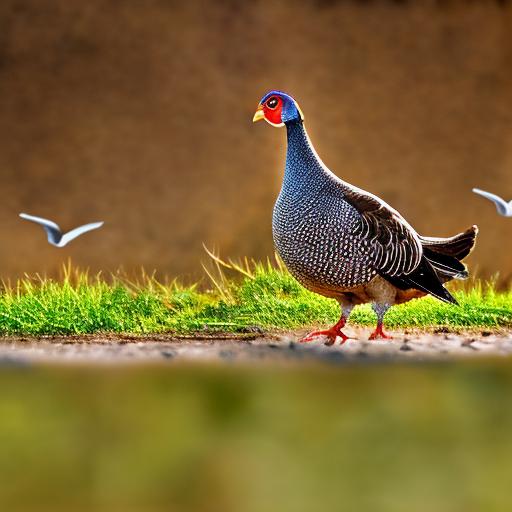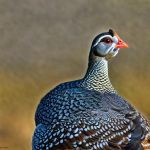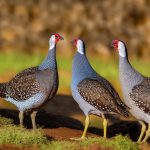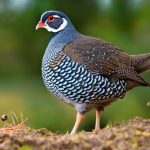Free range guinea fowl have specific needs that must be met in order for them to thrive in their environment. These birds are highly social creatures and require ample space to roam and forage. They are also known for their strong instinct to roost in trees at night, so providing suitable trees or structures for them to perch on is essential. Additionally, guinea fowl are highly alert and have a strong sense of curiosity, so they require a stimulating environment with plenty of opportunities for exploration and mental stimulation.
In addition to their social and environmental needs, free range guinea fowl also require protection from predators. These birds are vulnerable to a wide range of predators, including foxes, raccoons, and birds of prey. Therefore, it is important to create a safe and secure environment for them to roam freely without the threat of predation. Understanding the specific needs of free range guinea fowl is crucial for creating an environment in which they can thrive and flourish.
Key Takeaways
- Free range guinea fowl need space to roam and forage, as well as shelter from the elements and predators
- Creating a suitable environment for free range guinea fowl involves providing access to grassy areas, dust baths, and perches
- Proper nutrition for free range guinea fowl includes a balanced diet of grains, greens, insects, and access to clean water
- Ensuring the health and well-being of free range guinea fowl involves regular health checks, vaccinations, and parasite control
- Managing the behavior and social dynamics of free range guinea fowl requires understanding their natural instincts and providing adequate space for social interactions
- Protecting free range guinea fowl from predators involves securing their coop at night and using deterrents such as fencing and guard animals
- Harvesting and utilizing the benefits of free range guinea fowl includes collecting eggs, controlling insect populations, and utilizing their meat for culinary purposes
Creating a suitable environment for free range guinea fowl
Creating a suitable environment for free range guinea fowl involves providing ample space for them to roam and forage. These birds are highly active and require plenty of room to move around and explore. It is recommended to provide at least 250 square feet of space per bird to ensure they have enough room to exhibit natural behaviors such as dust bathing and foraging for insects and seeds. Additionally, providing suitable trees or structures for them to roost in at night is essential, as guinea fowl have a strong instinct to roost off the ground for safety.
In addition to space and roosting structures, it is important to provide a stimulating environment for free range guinea fowl. This can be achieved by incorporating natural elements such as logs, branches, and shrubs into their environment to encourage exploration and mental stimulation. Creating a diverse and natural environment will help to keep the guinea fowl engaged and content. Finally, it is crucial to provide protection from predators by securing the perimeter of the free range area with fencing or netting to prevent access from potential threats. By creating a suitable environment that meets the specific needs of free range guinea fowl, they will be able to thrive and lead happy, healthy lives.
Providing proper nutrition for free range guinea fowl
Proper nutrition is essential for the health and well-being of free range guinea fowl. These birds are omnivorous and have a varied diet that includes insects, seeds, grains, and vegetation. When allowed to free range, guinea fowl will naturally forage for insects and seeds, but it is important to supplement their diet with a balanced feed to ensure they are receiving all the necessary nutrients. A high-quality game bird feed that is specifically formulated for guinea fowl can be provided to supplement their natural foraging.
In addition to a balanced feed, it is important to provide access to fresh water at all times. Guinea fowl are highly active birds and require ample hydration, especially during hot weather. It is recommended to provide water in shallow containers that are easily accessible to the birds. Additionally, providing access to grit or small stones is important for guinea fowl, as it aids in the digestion of their food. By providing proper nutrition, including a balanced feed, fresh water, and access to grit, free range guinea fowl will be able to maintain optimal health and vitality.
Ensuring the health and well-being of free range guinea fowl
Ensuring the health and well-being of free range guinea fowl involves regular monitoring and observation of the birds. It is important to be familiar with the normal behaviors and appearance of the birds in order to quickly identify any signs of illness or distress. Regular health checks should be conducted to assess the overall condition of the birds, including their weight, feather quality, and general demeanor.
In addition to regular health checks, it is important to provide appropriate veterinary care as needed. This may include vaccinations, parasite control, and treatment for any injuries or illnesses that may arise. It is also important to provide a clean and sanitary living environment for the birds, as this can help prevent the spread of disease and illness. By ensuring the health and well-being of free range guinea fowl through regular monitoring, veterinary care, and a clean living environment, they will be able to lead healthy and fulfilling lives.
Managing the behavior and social dynamics of free range guinea fowl
Managing the behavior and social dynamics of free range guinea fowl involves understanding their natural behaviors and social structure. Guinea fowl are highly social birds that form strong bonds within their flock. They have a complex social hierarchy with established pecking orders, so it is important to provide ample space and resources to prevent aggression and competition within the flock.
In addition to managing social dynamics within the flock, it is important to provide opportunities for natural behaviors such as dust bathing, foraging, and roosting. By creating a stimulating environment with plenty of opportunities for natural behaviors, the birds will be able to exhibit their natural instincts and behaviors in a healthy and positive way. Understanding and managing the behavior and social dynamics of free range guinea fowl is essential for promoting a harmonious and content flock.
Protecting free range guinea fowl from predators
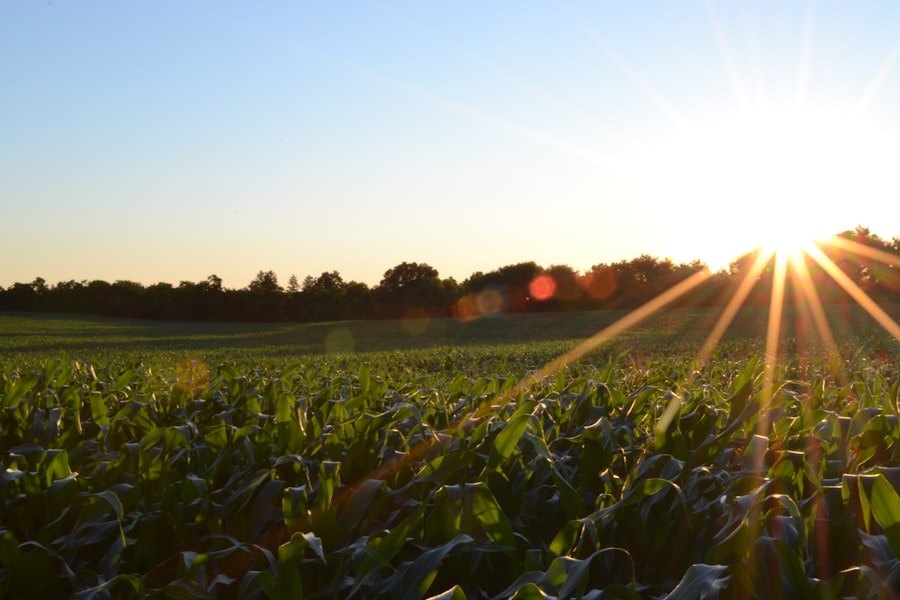
Protecting free range guinea fowl from predators is essential for their safety and well-being. Guinea fowl are vulnerable to a wide range of predators, including foxes, raccoons, birds of prey, and domestic dogs. It is important to secure the perimeter of the free range area with fencing or netting to prevent access from potential threats. Additionally, providing suitable roosting structures off the ground can help protect the birds from ground-dwelling predators.
In addition to securing the perimeter of the free range area, it is important to be vigilant and observant for signs of potential predators in the area. This may include monitoring for tracks or signs of disturbance around the perimeter of the free range area. Providing suitable shelter or hiding spots within the free range area can also help protect the birds from potential threats. By taking proactive measures to protect free range guinea fowl from predators, they will be able to roam freely without the threat of predation.
Harvesting and utilizing the benefits of free range guinea fowl
Harvesting and utilizing the benefits of free range guinea fowl involves understanding how to humanely harvest the birds for meat or eggs. Guinea fowl meat is known for its lean and flavorful qualities, making it a popular choice for culinary purposes. When harvesting guinea fowl for meat, it is important to do so in a humane manner that minimizes stress and discomfort for the birds.
In addition to meat, guinea fowl also produce eggs that are prized for their rich flavor and nutritional value. Harvesting eggs from free range guinea fowl involves collecting them regularly from their nesting areas. Guinea fowl eggs are similar in size to chicken eggs but have a thicker shell and richer yolk. They can be used in a variety of culinary applications, from baking to cooking.
In addition to meat and eggs, guinea fowl also provide pest control benefits by foraging for insects in their environment. This natural pest control can be beneficial for gardens or agricultural areas where insect control is needed. By understanding how to humanely harvest guinea fowl for meat or eggs, as well as utilizing their natural pest control benefits, free range guinea fowl can provide a variety of valuable resources.
If you’re considering keeping free range guinea fowl, you may also be interested in learning about the benefits of renting a chicken coop. Renting a coop can be a convenient and cost-effective option for those who want to raise poultry without the commitment of building or maintaining a permanent structure. Check out this informative article on renting a chicken coop to explore this alternative approach to poultry keeping.
FAQs
What is free range guinea fowl?
Free range guinea fowl are domesticated birds that are allowed to roam freely and forage for food in a natural environment, as opposed to being confined to a small space.
How do you keep free range guinea fowl?
To keep free range guinea fowl, provide them with a large outdoor area to roam and forage, as well as access to shelter and fresh water. It’s important to protect them from predators and provide them with a balanced diet.
What do free range guinea fowl eat?
Free range guinea fowl eat a variety of foods, including insects, seeds, grains, and vegetation. They are natural foragers and will find much of their own food if given the opportunity.
How do you protect free range guinea fowl from predators?
To protect free range guinea fowl from predators, provide them with secure shelter at night, such as a coop or enclosed area. Additionally, consider using fencing or netting to keep out predators during the day.
Are there any health concerns when keeping free range guinea fowl?
Free range guinea fowl may be susceptible to parasites, diseases, and injuries from predators. It’s important to monitor their health and provide appropriate veterinary care when needed.
What are the benefits of keeping free range guinea fowl?
Keeping free range guinea fowl can help control insect populations, provide natural pest control for gardens and crops, and produce flavorful, nutritious eggs and meat. Additionally, they can add beauty and diversity to a farm or homestead.
Meet Walter, the feathered-friend fanatic of Florida! Nestled in the sunshine state, Walter struts through life with his feathered companions, clucking his way to happiness. With a coop that’s fancier than a five-star hotel, he’s the Don Juan of the chicken world. When he’s not teaching his hens to do the cha-cha, you’ll find him in a heated debate with his prized rooster, Sir Clucks-a-Lot. Walter’s poultry passion is no yolk; he’s the sunny-side-up guy you never knew you needed in your flock of friends!

